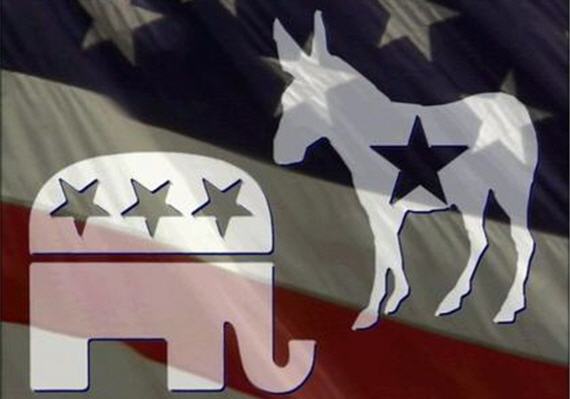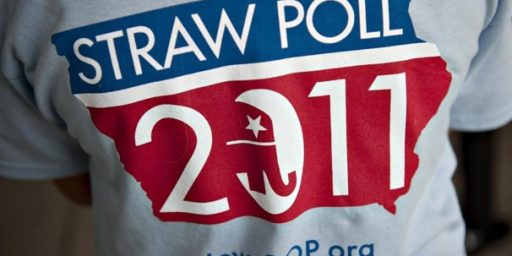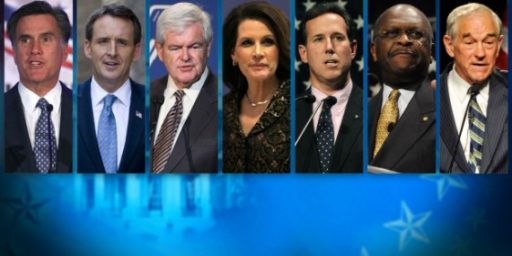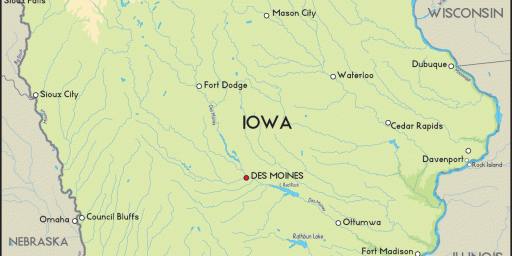You Want to Talk about Something Broken in our Politics?
I got your broken right here: the presidential nomination process.
 I noted the other day that despite the very real (and very understandable) frustration with the way the debt ceiling debate played out, that the the system was not broken. However, James Joyner’s post on Tim Pawlenty’s strategizing regarding the Ames Straw Poll reminded me that of something that is pretty broken in our system: the way we select nominees by the major political parties.
I noted the other day that despite the very real (and very understandable) frustration with the way the debt ceiling debate played out, that the the system was not broken. However, James Joyner’s post on Tim Pawlenty’s strategizing regarding the Ames Straw Poll reminded me that of something that is pretty broken in our system: the way we select nominees by the major political parties.
I will allow, it is not broken in the sense that it does produce nominees. It is, however, broken if the goal is to create a process by which the best national candidates are chosen. This us by definition the case given that the system is such that it focuses very heavily not just on regions before it focuses nationally, but it focuses on two specific states über alles: Iowa and New Hampshire. There’s a lot wrong with a process that is alleged to be working to select a national candidate that focuses so much attention on specific states that a) are not even representative of the country, and b) achieved their status largely via happenstance.*
To get directly to the point: the purpose of the nomination process is to pick a candidate of national appeal and significance. Instead, the system we currently have encourages candidates who can generate support in very narrow populations: Iowa and New Hampshire with the rest of the country being an afterthought. The significance of these events are sufficiently large that they affect national policy (think ethanol, for example).
It is bad enough that the formal processes in Iowa and New Hampshire play such a pivotal role** in the process, but we are at the point that candidates spend tens of thousands of dollars on a straw poll. A straw poll is a self-selected sample of supporters (kinda like a sci fi for political geeks/the curious) and the Ames poll is more about organization than it is about real support (of course, to some significant degree this is true about the Iowa Caucuses as well).
A description of the Ames straw poll can be found here (Ames Straw Poll) and includes the following:
Each candidate has paid for space in the lot, but what happens on those spaces is up to them, Casey Mills, spokesman for the Republican Party of Iowa, said.
“We view our responsibility as holding a first-rate event, an accurate barometer of how Iowans are looking at the 2012 presidential election,” Mills said. “The candidates are responsible for renting tents, generators, ice machines and purchasing refreshments.”
Entertainment also will be the responsibility of the candidates, he said. For example, Bachmann’s campaign has announced there will be live music at her venue.
As far as reliable methods to create “an accurate barometer of how Iowans are looking at the 2012 presidential election” the above sounds like a pretty lousy process. Take the money and do a real poll, if that’s what you want. Indeed, if you want an example of “broken” this is it. It’s like your weatherman saying that he was using input from his Twitter feed to determine barometric pressure. It is possible that he could guestimate it, but there are far better ways get a true and accurate reading.
And, of course, the fact that what Iowans think about the candidates will be used, eventually, to pretend like we know something about national views of the candidates only makes it all the worse.
I suppose one could technically argue that the system functions as designed, although I would counter that I am not sure that there is a whole lot of conscious design to this “system.” It sort of organically evolved over time and then entrenched interests (like political actors in Iowa and New Hampshire) have fought hard to maintain the process.
The main thing I can say is that that the process does eventually produce a nominee. In that sense, it “works.” However, there are better ways to choose candidates, to be sure.
—-
*A lengthy process in the evolution of the nomination process created the current calendar. It hardly the stuff of design. To summarize a lengthy history, let’s just say that both of these states were in the right place at the right time, and this catapulted them to far more significance than they deserve.
**And yes, I do know that NH is more significant than Iowa.





The fact that Iowa has such a disproportionate impact on our national politics is one of the worst ongoing scandals of our lifetimes.
No offense to Iowans but come on, let’s get a clue. It’s a small state with only one major industry, which so happens to be subsidized by federal taxpayers nationwide. That their process is not even based upon a direct vote adds injury to the insult. Then we double down on stupid by having New Hampshire (a tiny state, no major industries, minuscule population) be the first primary. It’s ludicrous.
There should be one national primary for both parties in all 50 states on the same day. Structured the same way the Electoral College is structured. The candidate for each party with the most “primary electoral votes” is the nominee. Done. End of story. No endless campaign. No delegates. No superdelegates. No horse trading. No more pandering to special interest groups swimming in small ponds.
While I don’t disagree with your article, there’s something missing, as indicated in the following:
One would need to define “best” for this purpose. I have no doubt that many folks from all over the various political spectra would have varying definitions for the term.
@Tsar Nicholas II:
The problem with this is that it gives the national press too much control over the nominations. Up until people actually start voting, there’s no reality check on their speculation about who’s in the lead (remember in 2008 where they were telling us that Guliani and Clinton were shoe ins up until people actually started voting). With a national primary, that means that by the time it becomes obvious how wrong they were, it’s too late to react to it because the election is already over.
I completely agree with Boyd, above, on this. How is “best” to be defined? Most electable? (whatever that means, a post hoc assessment if ever there was one) Most representative of the party’s views?
I agree that “best” was a poor choice of words.
I mean something along the lines of representative of national electorates, rather than appealing to a far narrower constituency of those electorates (i.e., the Dem and Rep nominating electorates).
@Dave Schuler:
Any body but a Republican.
(couldn’t resist)
@Steven L. Taylor: I think Hillbilly’s response illustrates an even greater point, though: a consensus on what constitutes the “best” candidate is likely impossible to achieve, even if it were limited to the members of the candidate’s party.
@Boyd: Well, as noted, the word “best” was not the, well, best choice. See my comment above.
@Steven L. Taylor: Sorry, my shorthand somewhat ignored your response. Maybe that’s because “best” is the best term for the circumstances. 🙂
But my point still stands, I think, that regardless of how it’s termed, “most desirable” or even “party choice” or whatever else we can come up with, there’s no consensus on how it would be defined.
@Boyd: Yes, but it isn’t that hard to see that perhaps a system designed to produce a national result is not well served by a system that focuses on only a segment of the nation.
@Tsar Nicholas II: There should be one national primary for both parties in all 50 states on the same day
And looking at this year’s GOP field…who would even be able to participate in such a primary? Not Bachman, surely, but also not Huntsman or Pawlenty or Cain or Paul or Santorum. I don’t even think Gingrich or Perry could seriously contest 50 states at once. And no one like those candidates would ever again have the slightest chance of even thinking about running for President. We’d be left with the super-rich like Romney or media sensations like Palin.
Mike
@Steven L. Taylor: You’re right, the deficiencies of our current system are easy to see. The hard part, though, is finding something that’s better and where unintended consequences don’t rear their ugly heads and leave us worse off than before we started tinkering with the system.
This small-state kickoff is undoubtedly a bad way to go about electing a President. To some degree, though, I’m reminded of that Churchill quote about democracy being the worst form of government except for every other form that’s been tried.
@Steven L. Taylor: a system designed to produce a national result is not well served by a system that focuses on only a segment of the nation.
Hm. Seems to have worked pretty well so far. The only time the process has really failed to produce a candidate that would be up to the job was in 2000, and I don’t think you can blame iowa or New Hampshire for that.
Mike
“There should be one national primary for both parties in all 50 states on the same day.”
National Primary!?!
Does this mean all the states will hold primaries and caucuses on the same day following the various state laws controlling these contests? Don’t some states currently have different nominating processes for different parties on different dates under the current system? Apparently those states laws will have to be changed.
Or maybe all the State Political organizations will just give up their power to the National Political Parties so this Super X 50 Vote can be held.
Will there be one ballot with all parties candidates listed so this is an open primary with Dems voting to nominate Sarah Palin for instance or will both (only two?) parties each have their own list of candidates?
In Illinois when I registered to vote I did not have to declare any Political Party affiliation. When I vote in the presidential primary I must select a Republican or Democratic ballot. But I do not have to be a member of either party.
Is this the model for the National Primary?
Of course since this is a National Primary maybe the government in DC should somehow pass federal election laws overriding the states election laws and dictate to electors when and where they get to choose the candidates for the party of their choice.
This will be a convenience for citizens who may be out of State on Super X 50 Primary Election Day. All Polling Places across the country will have the same ballot for Presidential candidates so voters will not have any excuse not to vote no matter where they are.
Oh, by the way, this is just for the US Presidential candidates right?
Primaries to select US Senate, US House of Representatives and State and Local races will remain unchanged.
I think that this post and comment thread are just a long-winded way of saying that we’d be better served by smoke-filled rooms. Smoke-free, of course.
@Dave Schuler: Well, if I’m the only one in the room, it won’t matter if it’s smoke-free or not, will it?
@Boyd:” This small-state kickoff is undoubtedly a bad way to go about electing a President. ”
To prove your previous point, I strongly disagree. Without a small-state ramp-up, I think we’d move pretty close to corronation by name-recognition, probably with a lot of Senators and fewer Governors. To me a primary system should have three components:
1. Small state ramp up;
2. Regional diversification;
3. Focus on Battlegrounds.
Iowa and New Hampshire arguably fit that mold, the problem might be that some of the other states that follow, like South Carolina, don’t.
I think the system works surprisingly well. Not just in nominating candidates, but in nominating good ones.
If we were designing a system from the top down, the likelihood is that we would have a national primary system. When you look at the presidents that would have been hindered by this, such as Barack Obama and Bill Clinton, you see candidates wherein the current system allowed them to get themselves out there. From a selection standpoint, maybe we could do better, but I fear that we would do worse.
Of course, like the EC it gives people in some states a bigger voice in states than others, but I’m not sure that Iowa and New Hampshire are all that bad, as far as it goes. They’re relatively inexpensive states to campaign in, allowing organizational skills and retail politics to matter more than the ability to buy major-market ads.
Considering how accidentally we stumbled on the system, I think it works surprisingly well.
@Trumwill:” . . such as Barack Obama and Bill Clinton . . .”
I think that’s a good point. Iowa has been the most influential when it endorses somebody outside of it’s local predilections, such as a black man (Obama) or a previously unheard of Southern Governor (Carter). It’s least influential when it’s perceived as too provincial such as an Iowan (Harkin) or a Christian evangelical (Huckabee).
@PD Shaw:
I point you back to my reference to the Churchill quote, PD. This is the worst possible way to go about it, except for every other approach we’ve considered.
@Dave Schuler:
Actually, no (at least not from my POV). I think that it would be more than possible to devise a better system of electoral consultation.
A rotation among several small states as to who holds the first primaries might be an effective variant. A rotation would have it so that Iowa and NH aren’t always the “small states” and you’d get greater regional diversification as well.
@Steven L. Taylor: Like what, though? And, outside of the theoretical, how or when has our current system (in its modern form) failed us? Can you name a nominee and say “A better system would have avoided that.”?
The examples I can come up with (Dole, maybe Mondale) really don’t seem to be a product of our system’s peculiarities.
Really, the only big criticism is that an Iowa voter’s vote is worth more than an Idaho voter’s. But outside of a couple of policy distortions (ethanol, for example), that strikes me mostly as theoretical. Individually, our vote doesn’t matter all that much anyway.
So while I can see how some tweaks (such as Scott’s rotation of small states) could make for a better system, when I think about it I am truly astonished that we have as good a system as we do. The one we would have designed if we were thinking about it would have been much worse.
The modern primary system has been in place (more or less) since 1972. What candidates since then that received the nomination proably would not have under the hypothetical better system? What candidates since then that did not receive the nomination probably would have under the hypothetical better system?
@Dave Schuler: This is, of course, impossible to answer.
My objections are grounded fundamentally in democratic theory: if the system is supposed to be producing a candidate in a democratic fashion via consulting with the electorates of the given parties, this is a rather lousy way of doing it, insofar as most of the primary voters end up being largely irrelevant.
It also creates what I consider a perverse set of campaign incentives and behaviors (such as candidates who practically move to Iowa or NH) or who become utterly enamored of corn ethanol subsidies.